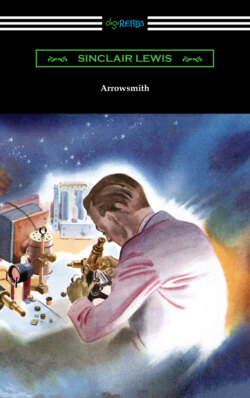Читать книгу Arrowsmith - Sinclair Lewis - Страница 47
На сайте Литреса книга снята с продажи.
Chapter IX
ОглавлениеI
The persistent yammer of a motor horn drew Martin to the window of the laboratory, a late afternoon in February. He looked down on a startling roadster, all streamlines and cream paint, with enormous headlights. He slowly made out that the driver, a young man in coffee-colored loose motor coat and hectic checked cap and intense neckwear, was Clif Clawson, and that Clif was beckoning.
He hastened down, and Clif cried:
“Oh, boy! How do you like the boat? Do you diagnose this suit? Scotch heather—honest! Uncle Clif has nabbed off a twenty-five-buck-a-week job with commissions, selling autos. Boy, I was lost in your old medic school. I can sell anything to anybody. In a year I’ll be making eighty a week. Jump in, old son. I’m going to take you in to the Grand and blow you to the handsomest feed you ever stuffed into your skinny organism.”
The thirty-eight miles an hour at which Clif drove into Zenith was, in 1908, dismaying speed. Martin discovered a new Clif. He was as noisy as ever, but more sure, glowing with schemes for immediately acquiring large sums of money. His hair, once bushy and greasy in front, tending to stick out jaggedly behind, was sleek now, and his face had the pinkness of massage. He stopped at the fabulous Grand Hotel with a jar of brakes; before he left the car he changed his violent yellow driving-gauntlets for a pair of gray gloves with black stitching, which he immediately removed as he paraded through the lobby. He called the coat-girl “Sweetie,” and at the dining-room door he addressed the head-waiter:
“Ah, Gus, how’s the boy, how’s the boy feeling tonight? How’s the mucho famoso majordomoso? Gus, want to make you ’quainted with Dr. Arrowsmith. Any time the doc comes here I want you to shake a leg and hand him out that well-known service, my boy, and give him anything he wants, and if he’s broke, you charge it to me. Now, Gus, I want a nice little table for two, with garage and hot and cold water, and wouldst fain have thy advice, Gustavus, on the oysters and hore duffers and all the ingredients fair of a Maecenan feast.”
“Yes, sir, right this way, Mr. Clawson,” breathed the headwaiter.
Clif whispered to Martin, “I’ve got him like that in two weeks! You watch my smoke!”
While Clif was ordering, a man stopped beside their table. He resembled an earnest traveling-man who liked to get back to his suburban bungalow every Saturday evening. He was beginning to grow slightly bald, slightly plump. His rimless eyeglasses, in the midst of a round smooth face, made him seem innocent. He stared about as though he wished he had someone with whom to dine. Clif darted up, patted the man’s elbow, and bawled:
“Ah, there, Babski, old boy. Feeding with anybody? Come join the Sporting Gents’ Association.”
“All right, be glad to. Wife’s out of town,” said the man.
“Shake hands with Dr. Arrowsmith Mart, meet George F. Babbitt, the hoch-gecelebrated Zenith real-estate king. Mr. Babbitt has just adorned his thirty-fourth birthday by buying his first benzine buggy from yours truly and beg to remain as always.”
It was, at least on the part of Clif and Mr. Babbitt, a mirthful affair, and when Martin had joined them in cocktails, St. Louis beer, and highballs, he saw that Clif was the most generous person now living, and Mr. George F. Babbitt a companion of charm.
Clif explained how certain he was—apparently his distinguished medical training had something to do with it—to be president of a motor factory, and Mr. Babbitt confided:
“You fellows are a lot younger than I am, eight-ten years, and you haven’t learned yet, like I have, that where the big pleasure is, is in Ideals and Service and a Public Career. Now just between you and me and the gatepost, my vogue doesn’t lie in real estate but in oratory. Fact, one time I planned to study law and go right in for politics. Just between ourselves, and I don’t want this to go any farther, I’ve been making some pretty good affiliations lately—been meeting some of the rising young Republican politicians. Of course a fellow has got to start in modestly, but I may say, sotto voce, that I expect to run for alderman next fall. It’s practically only a step from that to mayor and then to governor of the state, and if I find the career suits me, there’s no reason why in ten or twelve years, say in 1918 or 1920, I shouldn’t have the honor of representing the great state of Winnemac in Washington, D.C.!”
In the presence of a Napoleon like Clif and a Gladstone like George F. Babbitt, Martin perceived his own lack of power and business skill, and when he had returned to Mohalis he was restless. Of his poverty he had rarely thought, but now, in contrast to Clif’s rich ease, his own shabby clothes and his pinched room seemed shameful.
